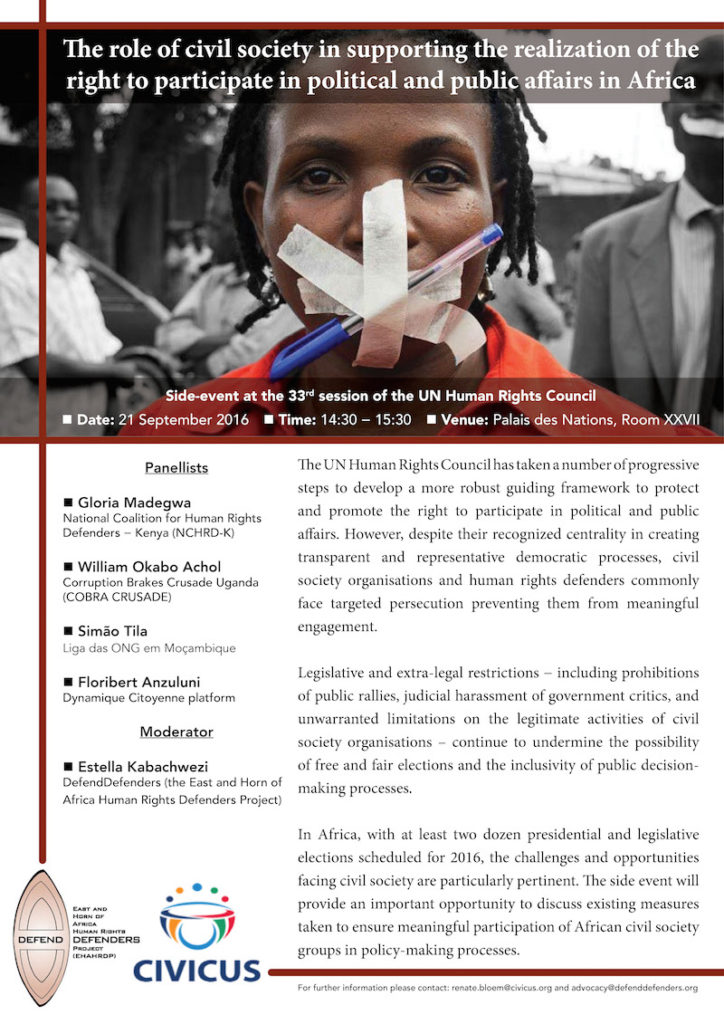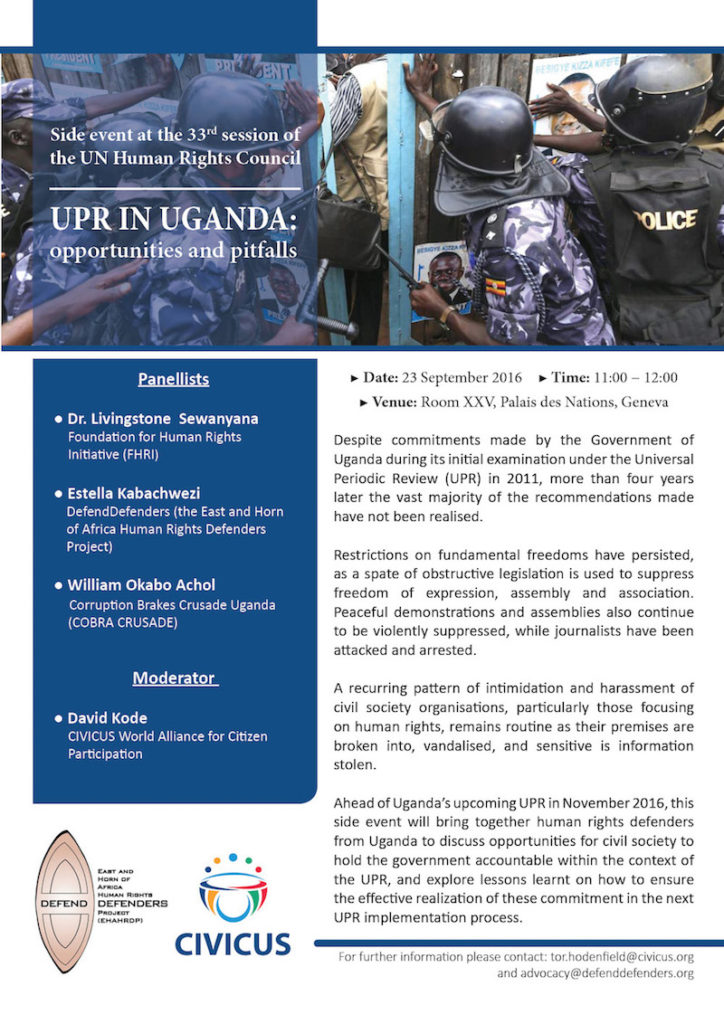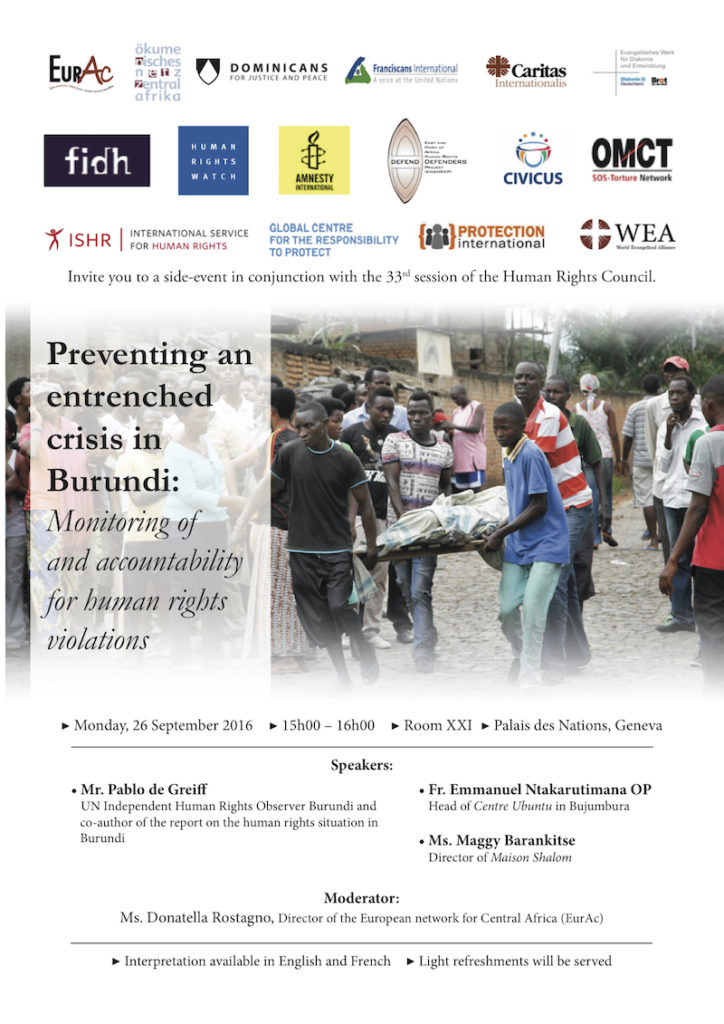The UN Human Rights Council (UNHRC)’s 33rd session was heavily focused on Africa, with Somalia, Sudan, Burundi, the Democratic Republic of the Congo (DRC) and the Central African Republic on the agenda. Much of our efforts this session went towards addressing human rights violations in Burundi, Somalia, South Sudan, and Sudan.
At the same time, on-going protests in Ethiopia’s Oromia and Amhara regions and the authorities’ use of the use of excessive and lethal force to disperse them present a crucial test for the country’s stability, and DefendDefenders welcomed the concerns voiced by the European Union and the Canadian delegations. DefendDefenders highlighted the urgency of the situation, and emphasised the need for an independent, impartial, and international investigation into the alleged abuses in its Item 4 statement.
On 20 September, the UN Independent Investigation on Burundi (UNIIB) published its final report, which concludes that there is abundant evidence of gross human rights violations and abuses perpetrated by the government, which may amount to crimes against humanity.
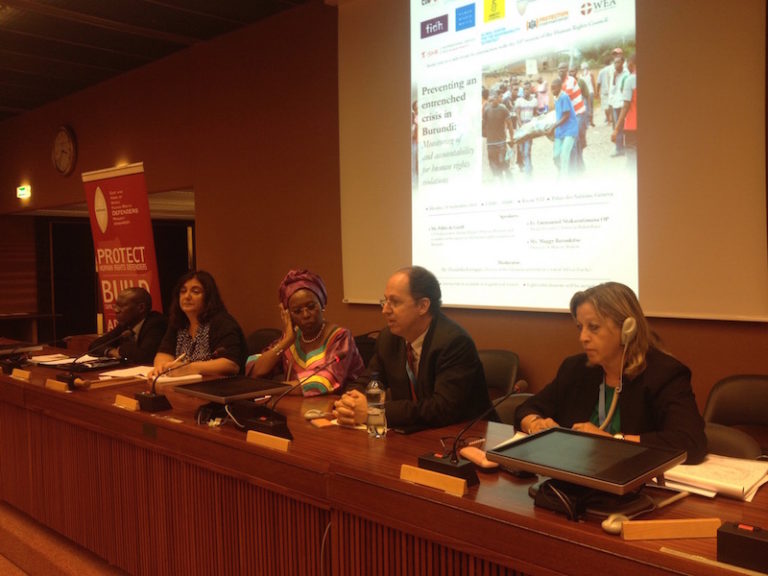
Pablo de Greiff (UN Independent Human Rights Observer Burundi and co-author of the report on the human rights situation in Burundi) addresses a full room during the-side event “Preventing an entrenched crisis in Burundi”
In February 2015, DefendDefenders published a report documenting early warning signs of the impending crisis that now engulfs Burundi. We have continued to engage in strong advocacy as the human rights situation continued to deteriorate, and supported Burundian human rights defenders to attend every session of the UNHRC since to draw attention to the gravity of the situation.
The decision of the UNHRC to establish a Commission of Inquiry to conduct an investigation into human rights violations with a view to ensuring full accountability reflects the dire situation in Burundi. In its ten-year history, the UNHRC has only established mandates for four such Commissions – two of which cover countries in the East and Horn of Africa.
In the days after the UNHRC concluded its deliberations, the Burundian government responded by declaring the three experts of the UNIIB persona non grata, suspending its collaboration with the Office of the High Commissioner for Human Rights (OHCHR), and signalling its intention to withdraw from the International Criminal Court.
However, as High Commissioner for Human Rights Zeid Ra’ad Al-Hussein stated in his opening remarks to the Council, the refusal to cooperate with OHCHR will not blind the world to human rights abuses, or deter efforts to ensure accountability for these violations.
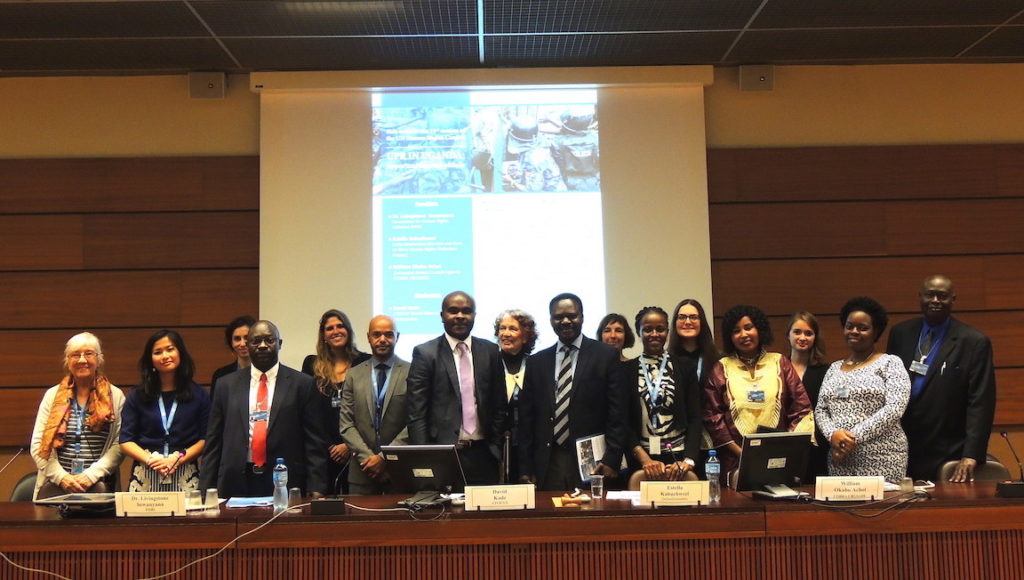
Panellists and audience, including the Ugandan ambassador to the UN Human Rights Council, at the side-event “UPR in Uganda: Opportunities and pitfalls”
Meanwhile, the surge of violence that swept through Juba in July 2016, just as the UNHRC concluded its 32nd session, is a continued source of concern. In the wake of the violence, civil society faces alarming levels threats, and in its Item 4 statement DefendDefenders drew attention to the worsening pattern security, humanitarian and human rights crises currently underway in Africa’s newest nation.
DefendDefenders’ delegation, comprised of human rights defenders from Burundi, Kenya, South Sudan, and Uganda, was also able to engage in constructive discussions on the right to political participation and Uganda’s upcoming Universal Periodic Review.
Oral Statements to the Council
19 September 2016
Item 4: General Debate
Delivered by Ms. Clementine de Montjoye
Thank you Mr. President.
The East and Horn of Africa Human Rights Defenders Project is gravely concerned with the escalating human rights crisis in Ethiopia. The situation has become increasingly unstable since security forces repeatedly fired upon protests in the Amhara and Oromia regions in August 2016, reportedly killing over 100 people. Since November 2015, Ethiopian security forces have routinely used excessive and unnecessary lethal force to disperse and suppress the largely peaceful protests in the Oromia region. According to international and national human rights groups, at least 600 demonstrators have been killed and hundreds have suffered bullet wounds and beatings by police and military since the protests began in November last year.
Mr. President, we echo the High Commissioner for Human Rights’ call for an independent and impartial investigation into all reported killings and other violations of human rights in the context of the protests. As Member and Vice President of this Council, we urge the Government of Ethiopia to uphold its obligations, and immediately cease the use of excessive and lethal force by security forces against protesters, accept an international investigation into the killings, give Special Procedures access to the country, and make public its own national human rights commission’s investigation on the Oromia protests.
Mr. President, we also wish to bring to your attention the alarming levels of threat civil society in South Sudan is facing today, which has significantly worsened since the July 2016 outbreak in fighting. We are gravely concerned about the UN Mission to South Sudan’s reports of serious threats made against civil society members who met with the UN Security Council delegation during their most recent visit to Juba this month. Human rights defenders and journalists have had to flee Juba by the dozen, particularly after attempting to document and report on the dramatic escalation in violence in July. At least seven NGOs working on human rights advocacy have recently reported being notified verbally or in writing that the renewal of their registration has been denied under the new NGO Act.
I thank you.
21 September 2016
Oral Intervention
Delivered by Ms. Estella Kabachwezi
Mr. President,
Despite Sudan’s commitments to ensure a safe and enabling environment for human rights defenders, civil society, the media, and members of the opposition, the East and Horn of Africa Human Rights Defenders Project and the African Centre for Justice and Peace Studies remain extremely concerned by the repeated arbitrary detention of such actors in Sudan. Detainees are routinely held incommunicado and without charge for prolonged periods, and organisations are forcibly closed and raided, thanks to sweeping powers under the 2010 National Security Act. Media houses are routinely raided and printed papers confiscated for reporting on “red line” issues such as allegations of human rights violations in conflict areas
10 staff members and affiliates of the Khartoum-based TRACKs for Training and Development currently face baseless charges, including crimes against the state that carry the death penalty, solely for the peaceful exercise of their rights. Their offices were raided twice over the past 18 months and three of them were held for 86 days without charge in inhumane conditions until their transfer to prison where they remain today.
The Sudanese authorities have also sought to block civil society participation in this review. In 2014, security officials raided the offices of the NGO Sudanese Human Rights Monitor during a workshop on the UPR. This year in March, four civil society activists were prevented from traveling and had their passports confiscated ahead of a UPR pre-session in Geneva.
Mr. President, five years after Sudan’s first UPR, Sudanese government forces continue to attack villages and bomb civilian areas indiscriminately, and to block humanitarian aid groups from accessing affected areas in South Kordofan and Blue Nile. During this review, the Sudan government has committed to allow full and unrestricted access by independent humanitarian organisations to all areas affected by conflict, and to allow aid agencies and NGOs to implement human rights programmes in those areas. It is vital that these commitments are adhered to and that members of this Council continue to urge Sudan to cease all attacks on civilians and uphold its commitments to fully respect freedom of expression, association and assembly throughout the country.
28 September 2016
Oral Statement by the East and Horn of Africa Human Rights Defenders Project and the African Centre for Justice and Peace Studies (ACJPS)
Delivered by Manon Karatas
Thank you Mr. President,
Our organisations, the East and Horn of Africa Human Rights Defenders Project and ACJPS, would like to express concern regarding the crackdown by the Government of Sudan on independent civil society, and the severe circumscription of the right to freedom of expression.
The National Intelligence and Security Services continue to detain individuals for up to four and a half months without charge. ACJPS has documented patterns of torture and ill-treatment of detainees, as well as summonses and threatening phone calls. 10 staff members and affiliates of TRACKs for Training and Development currently face baseless charges, including capital crimes against the state, solely for the peaceful exercise of their rights. Their offices were raided twice over the past 18 months and three of them were held for 86 days without charge in inhumane conditions until their transfer to prison.
A number of Sudanese laws restrict the right to peaceful expression, association and assembly. The NISS continues to censor the media, and have ordered newspapers not to report on so-called “red line” issues critical of the Government.
Authorities continue to break up demonstrations using excessive force. There has been no accountability for the victims of protests that took place in 2013, when Sudanese security forces fired live ammunition to disperse protestors, causing the deaths of at least 185 individuals. In February 2016, a group of 15 women were arrested and beaten with batons during a protest demanding accountability for those deaths.
The conflicts in South Kordofan, Blue Nile and Darfur continue to have a devastating impact on civilians.
We welcome the report of the Independent Expert on Sudan, and would like to emphasise the importance of engaging with independent civil society, both inside and outside the country. However, we continue to call for an Item 4 mandate given the gross and systematic violations of international human rights law and humanitarian law, lack of access for independent monitoring or reporting bodies, and clamp-down in independent civil society.
27 September 2016
Item 10: Enhanced Interactive Dialogue on Burundi
Delivered by Ms. Margaret Barankits
Thank you Mr. President.
The East and Horn of Africa Human Rights Defenders Project thanks the experts for their report. As a Burundian myself, I appreciate the work done by the experts to document the serious and disturbing reality in which my people live today.
Mr. President, we are extremely concerned about the violations presented by the experts, including arbitrary deprivation of life, enforced disappearances and allegations of torture and ill-treatment in official and non-recognised places of detention. Today, civil society struggles to investigate serious violations and abuses described in the report of the experts.
The human rights activists live in constant fear or exile. Violations and abuses committed mainly by agents of the state indicate that the Burundian government is waging a systematic and continued campaign of repression against its own people. I have seen for myself for myself the wounds left by the terrible torture methods detailed by experts. I dare not detail them in this august room.
The Government of Burundi, which is also a Member State of this Council, is accused of crimes that could represent crimes against humanity. Mr President, this Council must act today. A deadly silence has fallen over my country. Burundians die, are tortured, disappear without a trace, and perpetrators continue with impunity. We call for the establishment of a commission of inquiry to conduct thorough investigations, and to establish responsibility for the crimes, including where these crimes may constitute international crimes.
22 September 2016
Oral statement
Delivered by Estella Kabachwezi
The East and Horn of Africa Human Rights Defenders Project welcomes Tanzania’s efforts towards addressing human rights violations, with a particular focus on those targeting women and people with albinism. However, we remain concerned about the growing number of violations against human rights defenders who challenge the violation of land rights, civil and political rights, health related rights, and LGBTI rights, who are regularly targeted by the state, through arbitrary detention, judicial and administrative harassment, reprisals, and office raids.
Mr. President, restrictive legislation is being used to encroach on the right of human rights defenders to peacefully conduct their work. The restrictive Newspaper Act of 1976, which allows the Minister to ban a newspaper at his own discretion, is continuously used to silence media houses that are critical of the Government. The provision on publishing ‘false information” in the Cyber Crimes Act has been misused to prosecute critical and independent voices, notably on social media.
Exercising press freedom has become steadily more challenging for independent media houses that are facing both censorship from the state and self-censorship due to the climate of intimidation. On August 29 Magic FM and Radio Five, after hosting political discussions, were accused of broadcasting “seditious” material that could incite the public and disturb the peace and ordered to cease broadcasting immediately.
Organisations working on issues of sexual orientation and gender identity have been targeted and threatened with de-registration. Recently, the Community Health Education Services and Advocacy (CHESA), an organisation working on sexual minorities’ health was accused of promoting same sex relations, and were inspected for compliance with the ban on the sale and import of lubricants. In July, Cloud Television was ordered by the Tanzania Communications Regulatory Authority to repeatedly apologise to viewers following an interview with a homosexual man.
Mr President, we call on the Tanzanian government to implement their commitment to guaranteeing the freedom of expression and association by allowing human rights defenders, political opponents and journalists to express freely their views in line with international human rights law.
I thank you.
28 September 2016
Interactive Dialogue with the Independent Expert on Somalia
Delivered by Renate Bloem
Thank you Mr. President,
CIVICUS and the East and Horn of Africa Human Rights Defenders Project thank the Independent Expert on Somalia for his report.
As Somalia prepares for its electoral process later this year, we take this opportunity to welcome steps taken by the government to strengthen its human rights framework in preparation for the election.
While recognising this progress, we call on Somali authorities to make a concerted effort to address undue restrictions on freedom of expression. In particular, we call on Somalia to ensure that government officials’ threats and intimidation of media workers are swiftly and effectively investigated. In June 2016, Puntland Ministry of Information issued a directive restricting journalists from interviewing persons linked to pirates and terrorists, and in an audio recording, the Minister of Information threatened to use force and to kill journalists who violate the order. Although Al Shabaab has claimed responsibility for the majority of violations committed against media workers, the Government should cease its practice of closing radio stations and arresting journalists deemed critical.
Media workers have expressed concern that broad provisions in the new media law, signed by the president in January 2016, are likely to prompt self-censorship. We call on the government of Somalia to ensure that all of its laws, including the media law, are in line with its international and regional obligations.
Election periods present heightened challenges for media workers. Journalists will play a critical role in informing the public during Somalia’s electoral process, on top of their challenging coverage of the conflict. We echo the independent expert’s view that the role played by the media in Somalia is critical and indispensable as Somalia builds peace and democracy and consolidates the State, and should be protected and promoted by the State.
We therefore strongly urge the government to take effective and meaningful steps to implement the important recommendations put forward during its recent Universal Periodic Review examination and ensure the creation of a safe and enabling environment for media workers and human rights defenders during the upcoming electoral process.
Open letters to the Council
To Permanent Representatives of
Members and Observer States of the
UN Human Rights Council
Geneva, 8 September 2016
RE: Addressing the escalating human rights crisis in Ethiopia
Your Excellency,
The undersigned civil society organisations write to draw your attention to grave violations of human rights in Ethiopia, including the recent crackdown on largely peaceful protests in the Oromia and Amhara regions.
As the UN Human Rights Council prepares to convene for its 33rd session between 13 – 30 September 2016, we urge your delegation to prioritise and address through joint and individual statements the escalating human rights crisis in Ethiopia.
An escalating human rights crisis in Oromia and Amhara regions
The situation in Ethiopia has become increasingly unstable since security forces repeatedly fired upon protests in the Amhara and Oromia regions in August 2016. On 6 and 7 August alone, Amnesty International reported at least 100 killings and scores of arrests during protests that took place across multiple towns in both regions. Protesters had taken to the streets throughout the Amhara and Oromia regions to express discontent over the ruling party’s dominance in government affairs, the lack of rule of law, and grave human rights violations for which there has been no accountability.
Protests in the Amhara region began peacefully in Gondar a month ago and spread to other towns in the region. A protest in Bahir Dar, the region’s capital, on 7 August turned violent when security forces shot and killed at least 30 people. Recently, on 30 August, stay-at-home strikers took to the streets of Bahir Dar again and were violently dispersed by security forces. According to the Association for Human Rights in Ethiopia (AHRE), in the week of 29 August alone, security forces killed more than 70 protesters and injured many more in cities and towns across Northern Amhara region.
Since November 2015, Ethiopian security forces have routinely used excessive and unnecessary lethal force to disperse and suppress the largely peaceful protests in the Oromia region. The protesters, who originally advocated against the dispossession of land without adequate compensation under the government’s Addis Ababa Integrated Development Master Plan, have been subjected to widespread rights violations. According to international and national human rights groups, at least 500 demonstrators have been killed and hundreds have suffered bullet wounds and beatings by police and military during the protests.
Authorities have also arbitrarily arrested thousands of people throughout Oromia and Amhara during and after protests, including journalists and human rights defenders. Many of those detained are being held without charge and without access to family members or legal representation. Many of those who have been released report torture in detention. The continued use of unlawful force to repress the movement has broadened the grievances of the protesters to human rights and rule of law issues.
The need for international, independent, thorough, impartial and transparent investigations
Following the attacks by security forces on protesters in Oromia earlier this year, five UN Special Procedures issued a joint statement noting that “the sheer number of people killed and arrested suggests that the Government of Ethiopia views the citizens as a hindrance, rather than a partner”, and underlining that “Impunity … only perpetuates distrust, violence and more oppression”.
In response to the recent crackdown, the UN High Commissioner for Human Rights, Zeid Ra’ad Al Hussein, has called for “access for independent observers to the country to assess the human rights situation”. Ethiopia’s government, however, has rejected the call, instead indicating it would launch its own investigation. On 2 September, in a public media statement, the African Commission on Human and Peoples’ Rights reiterated the UN High Commissioner’s call to allow a prompt and impartial investigation led by regional or international human rights bodies into the crackdown.
There are no effective avenues to pursue accountability for abuses given the lack of independence of the judiciary and legislative constraints. During the May 2015 general elections, the ruling EPRDF party won all 547 seats in the Ethiopian Parliament.
Ethiopia’s National Human Rights Commission, which has a mandate to investigate rights violations, has failed to make public its June report on the Oromia protests, while concluding in its oral report to Parliament that the lethal force used by security forces in Oromia was proportionate to the risk they faced from the protesters. The Global Alliance of National Human Rights Institutions has rated the Ethiopian National Human Rights Commission as B, meaning the latter has failed to meet fully the Paris Principles.
The High Representative of the European Union for Foreign Affairs, Federica Mogherini, who met with Ethiopian Prime Minister Hailemariam Desalegn at the margins of the European Development Days in June 2016, has called on all parties to refrain from the use of force and for a constructive dialogue and engagement to take place without delay. On 28 August, after the EPRDF party’s general assembly, Prime Minister Hailemariam reportedly ordered the country’s military to take any appropriate measures to quell the protests, which he described as illegal and aimed at destabilising the nation. Following a similar call regarding the Oromia protests, security forces intensified the use of excessive force against protesters.
A highly restrictive environment for dialogue
Numerous human rights activists, journalists, opposition political party leaders and supporters have been arbitrarily arrested and detained. Since August 2016, four members of one of Ethiopia’s most prominent human rights organisations, the Human Rights Council (HRCO), were arrested and detained in the Amhara and Oromia regions. HRCO believes these arrests are related to the members’ monitoring and documentation of the crackdown of on-going protests in these regions.
Among those arrested since the protests began and still in detention are Colonel Demeke Zewdu (Member, Wolkait Identity Committee (WIC)), Getachew Ademe (Chairperson, WIC), Atalay Zafe (Member, WIC), Mebratu Getahun (Member, WIC), Alene Shama (Member, WIC), Addisu Serebe (Member, WIC), Bekele Gerba (Deputy Chair, Oromo Federalist Congress (OFC)), Dejene Tufa (Deputy General Secretary, OFC), Getachew Shiferaw (Editor-in-Chief of the online newspaper Negere Ethiopia), Yonathan Teressa (human rights defender) and Fikadu Mirkana (reporter with the state-owned Oromia Radio and TV).
Prominent human rights experts and groups, including the UN High Commissioner for Human Rights, have repeatedly condemned the highly restrictive legal framework in Ethiopia. The deliberate misuse of the Anti-Terrorism Proclamation’s overbroad and vague provisions to target journalists and activists has increased as protests have intensified. The law permits up to four months of pre-trial detention and prescribes long prison sentences for a range of activities protected under international human rights law. Dozens of human rights defenders as well as journalists, bloggers, peaceful demonstrators and opposition party members have been subjected to harassment and politically motivated prosecution under the Anti-Terrorism Proclamation, making Ethiopia one of the leading jailers of journalists in the world.
In addition, domestic civil society organisations are severely hindered by one of the most restrictive NGO laws in the world. Specifically, under the 2009 Charities and Societies Proclamation, the vast majority of Ethiopian organisations have been forced to stop working on human rights and governance issues, a matter of great concern that has been repeatedly raised in international forums including at Ethiopia’s Universal Periodic Review (UPR).
This restrictive and worsening environment underscores the limited avenues available for dialogue and accountability in the country. It is essential that the UN Human Rights Council take a strong position urging the Ethiopian government to immediately allow an international, thorough, independent, transparent and impartial investigation into alleged human rights abuses committed in the context of the government’s response to the largely peaceful protests.
As a member – and Vice-President – of the Human Rights Council, Ethiopia has an obligation to “uphold the highest standards” of human rights, and “fully cooperate” with the Council and its mechanisms (GA Resolution 60/251, OP 9). Yet for the past ten years, it has consistently failed to accept country visit requests by numerous Special Procedures.
During the upcoming 33rd session of the Human Rights Council, we urge your delegation to make joint and individual statements reinforcing and building upon the expressions of concern by the High Commissioner, UN Special Procedures, and others.
Specifically, the undersigned organisations request your delegation to urge Ethiopia to:
- immediately cease the use of excessive and unnecessary lethal force by security forces against protesters in Oromia and Amhara regions and elsewhere in Ethiopia;
- immediately and unconditionally release journalists, human rights defenders, political opposition leaders and members as well as protesters arbitrarily detained during and in the aftermath of the protests;
- respond favourably to country visit requests by UN Special Procedures;
- urgently allow access to an international, thorough, independent, impartial and transparent investigation into all of the deaths resulting from alleged excessive use of force by the security forces, and other violations of human rights in the context of the protests;
- ensure that those responsible for human rights violations are prosecuted in proceedings which comply with international law and standards on fair trials and without resort to the death penalty; and
- fully comply with its international legal obligations and commitments including under the International Covenant on Civil and Political Rights, the African Charter on Human and Peoples’ Rights, and its own Constitution.
Amnesty International
Article 19
Association for Human Rights in Ethiopia
CIVICUS: World Alliance for Citizen Participation
Civil Rights Defenders
DefendDefenders (East and Horn of Africa Human Rights Defenders Project)
Ethiopian Human Rights Project
FIDH (International Federation for Human Rights)
Foundation for Human Rights Initiative
Freedom House
Front Line Defenders
Global Center for the Responsibility to Protect
Human Rights Watch
International Service for Human Rights
Reporters Without Borders
World Organisation Against Torture (OMCT)
To Permanent Representatives of Members and Observer States of the UN Human Rights Council
Geneva, Switzerland
7 September 2016
Re: Current human rights and humanitarian situation in Sudan
Excellency,
Our organisations write to you in advance of the opening of the 33rd session of the United Nations Human Rights Council to share our serious concerns regarding the human rights and humanitarian situation in Sudan. Many of these abuses are detailed in the attached annex.
We draw your attention to the Sudanese government’s continuing abuses against civilians in South Kordofan, Blue Nile and Darfur, including unlawful attacks on villages and indiscriminate bombing of civilians. We are also concerned about the continuing repression of civil and political rights, in particular the ongoing crackdown on protesters and abuse of independent civil society and human rights defenders. In a recent example in March 2016, four representatives of Sudanese civil society were intercepted by security officials at Khartoum International Airport on their way to a high level human rights meeting with diplomats that took place in Geneva on 31 March. The meeting was organised by the international NGO, UPR Info, in preparation for the Universal Periodic Review (UPR) of Sudan that took place in May.[1]
We call upon your delegation to support the development and adoption of a strong and action-oriented resolution on Sudan under agenda item 4 at the 33rdsession of the UN Human Rights Council. The resolution should mandate a Special Rapporteur to monitor and report on ongoing human rights violations and recommend to the Sudanese government concrete ways to end them, and publicly urge the Government of Sudan to implement the recommendations made to Sudan by the UN Human Rights Council during its 2016 Universal Periodic Review.[2]
Five years on, the conflicts between Sudan and armed opposition in South Kordofan and Blue Nile continue to have a devastating impact on civilians. The most recent round of talks between the Government of Sudan and rebel movements ended in a standstill, with a lack of agreement on modalities for the provision of humanitarian aid and the cessation of hostilities.[3]
Sudanese government forces continue to attack villages and bomb civilian areas indiscriminately, and to block humanitarian aid groups from accessing affected areas. At least 1.7 million people, over half the population of the two areas, have been forced to flee their homes since the conflict started in 2011.[4] The National Human Rights Monitoring Organisation and Sudan Consortium documented twenty incidents of aerial bombardment in South Kordofan’s Heiban County in May 2016, including one incident on 1 May 2016, which resulted in the deaths of six children.[5] Government forces and allied militia have also been implicated in widespread levels of sexual violence. In February 2015, the Human Rights and Development Organisation reported how government forces raped at least 8 women in South Kordofan in one week.[6] The scale of sexual violence is likely much greater than any reports indicate.[7]
In Darfur, where conflict has continued for 13 years, government forces continue to attack civilians, especially in Jebel Mara. Over 80,000 civilians were newly displaced in Darfur in the first five months of 2016.[8] In 2015, the UN Panel of Experts on Sudan characterized Sudan’s strategy in Darfur as one of “collective punishment” and “induced or forced displacement” of communities from which the armed opposition groups are believed to come or operate.[9] The joint African Union – United Nations peacekeeping mission, UNAMID, has been largely unable to access the most affected conflict areas, due to government restrictions.[10]
Government forces continue to use excessive force to disperse demonstrations, resulting in death and injury and there has been no accountability for the deaths of more than 170 protesters killed during violent crackdowns in September and October 2013.
Across Sudan, national security officials and other security forces have targeted opposition party members, human rights defenders, students, and political activists for arrest, detention, and other abuses. In the UN Independent Expert’s second mission to Sudan in April 2016, he noted having received reports of prolonged detention without access to family and lawyers.[11]
Sudanese authorities also routinely repress the basic rights of women, including through public order provisions that criminalize “indecent” dress such as wearing trousers. Authorities have used these and other repressive laws to target female activists and human rights defenders for arrest, detention, and various forms of harassment, including sexual violence.[12] Authorities have restricted civil society organizations from operating freely, including those that fight for women’s rights.
In light of the situation in Sudan, the UN Human Rights Council must take stronger action in response to the widespread and grave violations of human rights and humanitarian law. We urge your delegation to ensure that the UN Human Rights Council adopts at its 33rd session a resolution under agenda item 4 to:
- Strengthen the special procedure mandate on Sudan by extending it as a Special Rapporteur on the situation of human rights in the Sudan under item 4, with a mandate to monitor and publicly and periodically report on violations of human rights and international humanitarian law in all parts of Sudan.
- Request the Office of the High Commissioner for Human Rights to urgently dispatch investigation teams, with expertise in sexual and gender-based violence, to investigate crimes under international law and serious violations and abuses of human rights in Darfur, South Kordofan and Blue Nile, identify those suspected of criminal responsibility, provide recommendations for accountability, and to report to the Council on its findings at the 35th session.
- On the 5th anniversary of the conflicts in South Kordofan and Blue Nile, condemn in the strongest terms the grave violations of human rights and international humanitarian law in South Kordofan and Blue Nile, including the continued indiscriminate aerial bombing of civilian populated areas, the use of cluster bombs, and other indiscriminate attacks on civilians by Government forces and allied militia, as well as the continued blockade of humanitarian aid.
- Similarly condemn attacks targeting the civilian population and civilian objects in Darfur, in particular looting, destruction of civilian facilities, killings and sexual violence committed by paramilitary forces and other Sudanese government forces, which has led to forced displacement of civilian populations;
- Urge the government of Sudan to allow unfettered access by UNAMID, humanitarian agencies and NGOs to all parts of Darfur and humanitarian agencies, and NGOs to all parts of Darfur, South Kordofan and Blue Nile.
- Urge the Government of Sudan to provide an update to the Council on concrete measures taken to implement the recommendations made to it during its UPR that enjoy its support, and the recommendations made by the Independent Expert following his visit in April 2016
- Urge the Government to address the continued impunity of security forces and ensure accountability for the killings of more than 170 protestors in Khartoum in September and October 2013, as well as more recent killings such as the student protestors killed in April 2016.
- Condemn the continued restrictions on the media, on human rights defenders and political opponents, freedoms of association and of peaceful assembly, and the use of arbitrary detention and torture, as detailed.
- Urgently call for the release of individuals arbitrarily detained by the NISS and urge the Government of Sudan to repeal the repressive National Security Act of 2010, and all other legislation which grants immunities to Government of Sudan agents.
We thank you for your attention to these pressing issues.
Sincerely,
Organisations
Act for Sudan
Alkarama Foundation
Al Khatim Adlan Centre for Enlightenment and Human Development (KACE)
African Centre for Justice and Peace Studies
Amnesty International
Cairo Institute for Human Rights Studies
Christian Solidarity Worldwide
CIVICUS World Alliance for Citizen Participation
Darfur Bar Association
Darfur Relief and Documentation Centre
DefendDefenders
Enough Project
Face Past for Future
Human Rights and Development Organisation
Human Rights Watch
International Commission of Jurists
International Federation for Human Rights (FIDH)
International Refugee Rights Initiative
National Human Rights Monitoring Organisation
Never Again Coalition
People4Sudan
REDRESS Trust
Skills for Nuba Mountains
Stop Genocide Now
Sudan Consortium
Sudan Democracy First Group
Sudanese Human Rights Initiative
Sudanese Human Rights Monitor
Sudan Unlimited
Waging Peace
Individuals
Dr. Abdel Mutaal Girshab, Human Rights Consultant.
Dr. Ahmed A. Saeed, civil society member and political activist.
Salih Amaar, Deputy Editor in Chief of Al-Taghyeer
[1] Joint NGO Letter, “Sudan blocks civil society participation in UN-led human rights review”, 31 March 2016.
[2] UN Human Rights Council Working Group on the UPR, “Draft report of the Working Group on the Sudan Universal Periodic Review”, May 2016.
[3] African Union High Level Implementation Panel on Sudan, “Statement on the AUHIP Cessation of Hostilities Negotiations”, 15 August 2016.
[4] Sudan Consortium, “Humanitarian Crisis in Sudan’s Two Areas and Darfur”, March 2015.
[5] National Human Rights Monitoring Organisation and Sudan Consortium, “Human Rights Update: May 2016”, August 2016.
[6] Radio Dabanga, “Govt. forces rape, wreak havoc in South Kordofan,” 23 February 2015,
[7] Coalition of NGOs, “Sudan: Joint Civil Society Statement regarding Sexual Violence in Conflict”, 20 June 2016.
[8] UN Office for the Coordination of Humanitarian Affairs, “Sudan: Darfur Humanitarian Overview”, 1 June 2016.
[9] UN Security Council, “Letter dated 16 January 2015 from the Vice-Chair of the Security Council Committee established pursuant to resolution 1591 (2005) concerning the Sudan addressed to the President of the Security Council”, 19 January 2015.
[10] Ibid.
[11] “Statement by the United Nations Independent Expert on the situation of human rights in Sudan, Mr. Aristide Nononsi, at the end of his first mission to Sudan”, April 2016.
[12] Human Rights Watch, “Good Girls Don’t Protest’: Repression and Abuse of Women Human Rights Defenders, Activists, and Protesters in Sudan”, 23 March 2016.
Side-events at the Council
Resolutions and outcomes
A/HRC/33/L.4 renews the mandate if the Independent Expert for a period of one year and calls upon the government to fully cooperate with the Special Procedures and permit effective access to all areas of the country, and to meet with all relevant actors.
A/HRC/33/L.6 condemns all attacks and violence against journalists and calls upon States to maintain a safe an enabling environment for journalists and media workers to perform their work independently and without undue interference.
A/HRC/33/L.28 urges all States to ensure the full, effective, and equal participation of all citizens in political and public affairs, and requests the Office of the High Commissioner to prepare draft guidelines for the effective implementation of the right to participate in public affairs.
A/HRC/33/L.11/Rev.1 renews the mandate of the Independent Expert on the situation of human rights in Somalia for the period of one year and calls for a credible, transparent, and inclusive election process in 2016.
A/HRC/33/L.31 establishes a one-year mandate for a Commission of Inquiry to conduct an investigation into human rights violations and abuses in Burundi since April 2015 and to identify alleged perpetrators with a view to ensuring full accountability.


